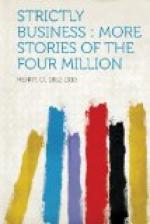“Back up, philosopher!” said Dan. “The penny has no sorrow that the dollar cannot heal.”
“Not in one instance,” repeated Kenwitz. “I will give you one, and let us see. Thomas Boyne had a little bakery over there in Varick Street. He sold bread to the poorest people. When the price of flour went up he had to raise the price of bread. His customers were too poor to pay it, Boyne’s business failed and he lost his $1,000 capital—all he had in the world.”
Dan Kinsolving struck the park bench a mighty blow with his fist.
“I accept the instance,” he cried. “Take me to Boyne. I will repay his thousand dollars and buy him a new bakery.”
“Write your check,” said Kenwitz, without moving, “and then begin to write checks in payment of the train of consequences. Draw the next one for $50,000. Boyne went insane after his failure and set fire to the building from which he was about to be evicted. The loss amounted to that much. Boyne died in an asylum.”
“Stick to the instance,” said Dan. “I haven’t noticed any insurance companies on my charity list.”
“Draw your next check for $100,000,” went on Kenwitz. “Boyne’s son fell into bad ways after the bakery closed, and was accused of murder. He was acquitted last week after a three years’ legal battle, and the state draws upon taxpayers for that much expense.”
“Back to the bakery!” exclaimed Dan, impatiently. “The Government doesn’t need to stand in the bread line.”
“The last item of the instance is—come and I will show you,” said Kenwitz, rising.
The Socialistic watchmaker was happy. He was a millionaire-baiter by nature and a pessimist by trade. Kenwitz would assure you in one breath that money was but evil and corruption, and that your brand-new watch needed cleaning and a new ratchet-wheel.
He conducted Kinsolving southward out of the square and into ragged, poverty-haunted Varick Street. Up the narrow stairway of a squalid brick tenement he led the penitent offspring of the Octopus. He knocked on a door, and a clear voice called to them to enter.
In that almost bare room a young woman sat sewing at a machine. She nodded to Kenwitz as to a familiar acquaintance. One little stream of sunlight through the dingy window burnished her heavy hair to the color of an ancient Tuscan’s shield. She flashed a rippling smile at Kenwitz and a look of somewhat flustered inquiry.
Kinsolving stood regarding her clear and pathetic beauty in heart-throbbing silence. Thus they came into the presence of the last item of the Instance.
“How many this week, Miss Mary?” asked the watchmaker. A mountain of coarse gray shirts lay upon the floor.
“Nearly thirty dozen,” said the young woman cheerfully. “I’ve made almost $4. I’m improving, Mr. Kenwitz. I hardly know what to do with so much money.” Her eyes turned, brightly soft, in the direction of Dan. A little pink spot came out on her round, pale cheek.




